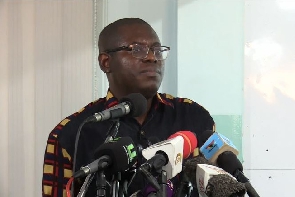Vice President of IMANI-Africa, Bright Simons has criticised Ghana’s new offer to creditors saying aspects of the summary of amendments to the Amended and Restated Memorandum requires clarification.
In a tweet on Friday after the release of the new offer, Bright Simons lashed out at the Finance Ministry insisting the summary contains clauses that are very difficult to understand.
“Such hardball tactics are not endearing” said Bright Simons in a social media post.
A revised prospectus for the domestic debt exchange program has finally been released by government.
Government on Thursday, 2nd February 2023 failed to present its revised and Final Exchange Memorandum as set forth in the Finance Ministry’s January 31st Press Statement.
However, Ghana’s new offer to its creditors was released after working hours on Friday.
Investors are required to review and sign the offer before the 7th February deadline.
Ghana’s Finance Ministry is making earnest moves to push towards the 80% creditor participation rate in the Domestic Debt Exchange Program to guarantee maximum debt relief.
A Debt Sustainability Analysis (DSA) conducted by the IMF demonstrated that Ghana’s public debt is unsustainable, thereby government may not be able to fully service its debt down the road if no action is taken.
Debt servicing is now absorbing more than half of total government revenues and almost 70% of tax revenues, while total public debt stock, including that of State-Owned Enterprises and among others exceeds 100% of GDP.
To address these risks and bring the debt stock to sustainable levels, government is embarking on on a Debt Restructuring Program dubbed a Debt Exchange Program to bring the country’s debt obligations to sustainable levels of 55% to GDP.
Government is in talks with domestic bond holders of approximately GHS137.3 billion of principal amount outstanding to exchange its domestic notes and bonds for a package of new bonds.
The exchange, part of a debt-sustainability plan required by the Washington-based lender is designed to offer relief to the country’s fiscal accounts through an exchange in coupon package on most domestically issued bonds providing a solid foundation for Ghana in the long-term to downsize its debt and reboot the economy.
Meanwhile, Ghana has reached a staff-level agreement with the IMF on economic policies and reforms to be supported by a new three-year arrangement under the Extended Credit Facility (ECF) of about US$3 billion.
Click to view details



General News of Sunday, 5 February 2023
Source: starrfm.com.gh
DDEP: Government's 'hardball tactics' in new offer not endearing – Bright Simons
Opinions
















